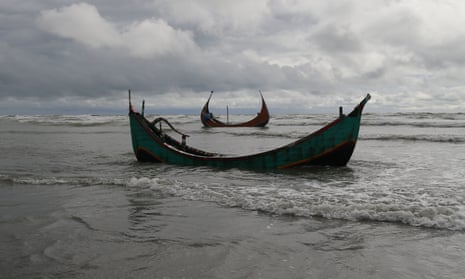An overcrowded boat carrying about 138 Rohingya refugees from Bangladeshi camps has sunk in the Bay of Bengal, leaving at least 15 confirmed dead and more than 50 still missing, Bangladeshi officials said.
The coastguard, navy divers and other rescuers recovered the bodies, mostly women, after the wooden boat’s keel hit undersea coral and capsized off St Martin’s Island.
Noor Ahmed, the top elected official on the island, said by phone from the scene that 71 refugees on the boat survived.
The passengers were enticed by traffickers to board the boat from various points as it headed for Malaysia, he said.
Iqbal Hossain, a police superintendent in Cox’s Bazar, said by phone the overcrowding of the boat, which may have also been carrying additional cargo, caused it to capsize. Hossain said the rescue operation was continuing.
Anwara Begum said two of her sons, aged six and seven, drowned in the tragedy. “We were four of us in the boat... Another child (son, aged 10) is very sick,” the 40-year-old told Agence France-Presse.
Fishermen tipped off the coast guard after they saw survivors swimming and crying for help in the sea.
“We swam in the sea before boats came and rescued us,” said survivor Mohammad Hossain, 20.
Nojuma Begum, a 26-year-old Rohingya woman, said she wanted to go to Malaysia to see her fiance.
“My marriage has been fixed with a person named Rafiq in Malaysia. I was being taken to Malaysia because he couldn’t come here. I was supposed to go by air. But, several trawlers reached Malaysia by sea, that’s why I boarded one,” she said.
Traffickers usually lure refugees by promising a better life overseas. Many past attempts to travel illegally by boat were thwarted by the coastguard.
The UN has been working with the government to raise awareness among refugees and local people about the risks they may face at sea. The UN is also supporting the strengthening of law enforcement capacities to counter smuggling and trafficking and protect those most at risk, UN agencies said.
More than 700,000 Rohingya Muslims have fled to Bangladesh from neighbouring Myanmar since August 2017 to escape a harsh crackdown by Myanmar’s military. Myanmar maintains that the minority Rohingya migrated illegally from Bangladesh, even though their families have lived in Myanmar for generations. Nearly all have been denied citizenship since 1982, effectively rendering them stateless.
